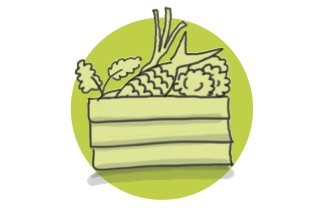For many with IBS, the symptoms are disruptive and debilitating, causing a great amount of frustration in their daily lives; and while at the moment the condition lacks a cure, there are many steps you can take to suppress the symptoms. A key fact to remember is that IBS affects all of its sufferers differently and a trigger food for one person might barely affect another. You yourself know your condition better than anyone so read-on and learn how to take back control over your gut.
Cut down on greasy food
After eating, our muscles in our digestive system get to work in a process known as the gastrocolic reflex [1], causing food to be churned and shifted along the gut. This effect is especially exacerbated by the consummation of large amounts of greasy, high-fat content foods, a problem which is all too prevalent in our modern western society [2]. For people that suffer from IBS, your far heightened gut sensitivity, coupled with all this additional digestive activity, leads to a multitude of common IBS symptoms developing. Whilst anyone should look to avoid greasy food, regardless of health conditions, for those with IBS, this should be an added incentive.
Link your IBS symptoms with other dietary diseases
Lactose intolerance is a condition whereby those who suffer from it are unable to digest lactose, a prevalent sugar in many dairy products. Interestingly, lactose containing products are often trigger foods for those with IBS. Moreover, a study conducted in China [3] showed that nearly three times the number of people had both lactose intolerance and IBS as opposed to just lactose intolerance (45% vs 17%). Whilst this study was only conducted on a small substrata of the Chinese population, it definitely displays the link between the two dietary diseases. As a result, you should perhaps look to lower your diary intake with low lactose products such as brie and parmesan or lactose-free milk.
Another major condition that has shown links with IBS is coeliac disease along with other wheat dependent diseases. A recent review carried out by an Italian group of scientists [4] identified that those with a form of ‘gluten/ wheat sensitivity … represent a subset of … patients with IBS’. The offending protein, gluten, causes your immune system to target the small intestine and leads to a large amount of discomfort for your gut. Thankfully, the gluten-free market has massively improved its range of products over the last few years and traditionally gluten rich products such as pasta have ‘free-from’ alternatives.
Identify you trigger foods
FODMAPS are a type of molecule which can cause a lot of problems for those with IBS. They consist of short-chained molecules which are said to ‘ferment’ in your digestive system [5]. This comes about due to those with IBS struggling to completely digest these molecules, leading to the accumulation of water in the small intestine and in turn causing fermentation of bacteria in the large intestine. This process leads to the release of a substantial amount of gas which irritates the highly sensitive gut of those with IBS. A whole plethora of foods contain varying amounts of FODMAPs and whilst it would be unreasonable to remove every single one from your diet, research conducted by Monash University found the following to be very significant offenders: watermelon, nectarines, and artichokes [6].
A major flare-up for those with IBS is spicy food. Whilst the science struggles to find a sound link between the two, one study suggests those with IBS have more of a specific type of nerve fibre especially reactive to a substance in chilli [7]. A second study examined those with a diet consisting in large part of spicy foods. A significant association was demonstrated in women who ate spicy food more than 10 times a week; they were twice as likely to have IBS compared to those who had a much cooler diet. Whilst extreme, this study serves to demonstrate a correlation between IBS and spicy food. So next time you’re out for a curry with your friends, perhaps opt to keep your gut happy and avoid a flare-up by choosing a korma.
IBS flare-ups can come from all different angles, with every aspect of your diet potentially contributing to gut irritation and distress. The best way to begin to control the symptoms is identifying which of the discussed triggers applies to your case of IBS and taking steps to reduce your daily intake of them. Whether it’s cutting down on your intake of greasy foods or going for the gluten-free options, there is plenty to be done to suppress your IBS.
RYH does not advise tackling a full FODMAP diet for an extended period of time and suggests you consult a health professional.
Bibliography
[1] B. Bolen, “Your Gastrocolic Reflex With IBS,” verywell health, [Online]. Available: https://www.verywellhealth.com/gastrocolic-reflex-1944913. [Accessed 26 03 2020].
[2] C. B. e. al., “Western Dietary Pattern Is Associated with Irritable Bowel Syndrome in the French NutriNet Cohort,” Nutrients, 2017.
[3] Y. W. X. G. &. M. C. Lishou Xiong, “Prevalence of lactose intolerance in patients with diarrhea-predominant irritable bowel syndrome: data from a tertiary center in southern China,” Journal of Health, Population and Nutrition , 2017.
[4] U. V. e. al., “Dietary Triggers in Irritable Bowel Syndrome: Is There a Role for Gluten?,” Journal of Neurogastroenterology and Motility, 2016.
[5] B. Bolen, “The Worst Trigger Foods for IBS,” verywell health, [Online]. Available: https://www.verywellhealth.com/top-trigger-foods-for-ibs-1945021. [Accessed 26 03 2020].
[6] J. V. J. B. K. S. P. C. P. R. G. J. G. Muir, “FODMAPs: food composition, defining cutoff values and international application,” Journal of Gastroenterology and Hepatology, 2017.
[7] Y. Y. P. F. J. R. F. W. P. A. S. G. A Akbar, “Increased capsaicin receptor TRPV1-expressing sensory fibres in irritable bowel syndrome and their correlation with abdominal pain,” GUT, 2008.
